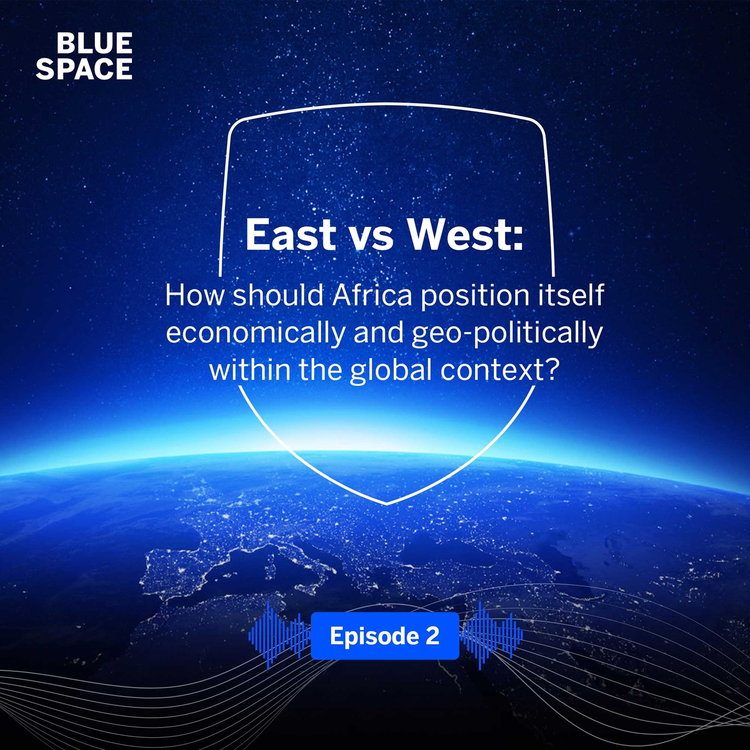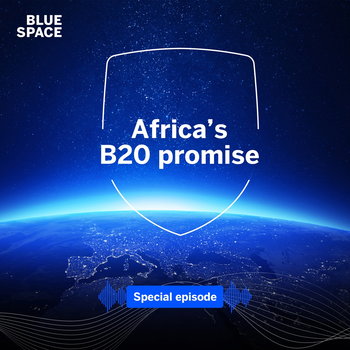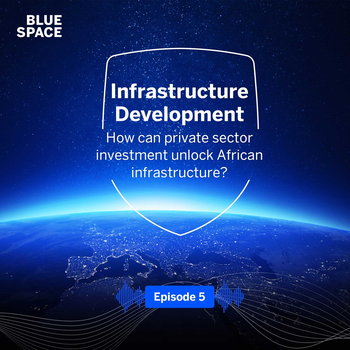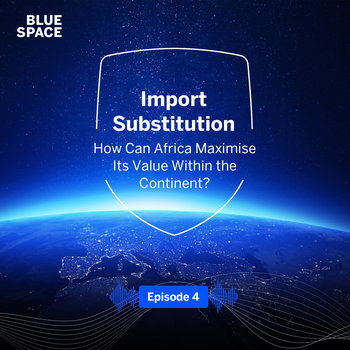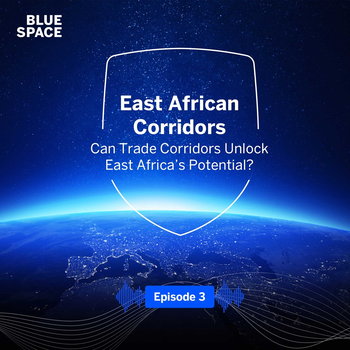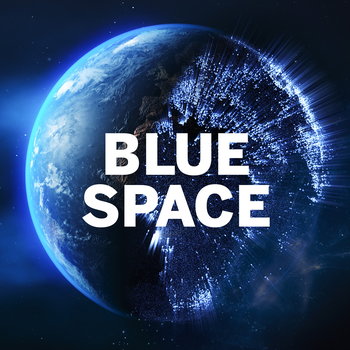00:06:
Africa is a continent caught in the middle.
00:09:
We have the United States to the west,
00:11:
China to the east.
00:13:
Both are vital to Africa's development.
00:16:
And while we count Europe as a key trade partner,
00:19:
we also work closely with Russia and with our partners
00:22:
in the Middle East.
00:23:
As East and West draw their battle lines on trade
00:26:
and geopolitics,
00:28:
where does Africa fit into the new global dynamic?
00:31:
Let's find out today in the Blue Space.
00:42:
Hello, I'm Joanne Joseph, and you're in the Blue Space,
00:45:
presented by Standard Bank Corporate and Investment
00:48:
Banking.
00:49:
Africa is not a country,
00:51:
but with the African Union as a political body and the African
00:54:
Continental Free Trade Area as an economic
00:56:
alliance,
00:57:
Africa is an increasingly formidable block on the
01:00:
global stage.
01:02:
But where does it stand relative to the rest of the world,
01:04:
and where should it position itself?
01:07:
Joining me to discuss this are Standard Bank's Chief
01:09:
Economist, Gulan Balan.
01:11:
And Michael Power,
01:12:
consultant at Asset Management Group 91.
01:15:
Gulan, Michael, welcome to the Blue Space.
01:17:
Lovely to have you with us today.
01:19:
So, Michael, just to give us an overview,
01:22:
the most significant global economic trends
01:25:
impacting Africa, in your opinion?
01:27:
Probably the same as the ones that are impacting the world.
01:29:
Demographics, debt, tech,
01:32:
the rise of Asia and climate change.
01:35:
Is it more or less the same for you, would you say, Gulan?
01:37:
Deep resonance with Michael's remarks.
01:40:
We are now also entering a new
01:42:
geopolitical era,
01:44:
from the moderate
01:46:
multilateralism of the last 30 years to
01:49:
a more contentious one.
01:52:
We embrace the geopolitical and political
01:55:
dynamism of the world and recognize that the
01:58:
channels through which it transmits is
02:01:
through trade and financial flows.
02:03:
Huge opportunities in terms of renewable energy for
02:06:
Africa, wouldn't you say, Michael?
02:07:
Well...
02:08:
The sun shines in Africa.
02:09:
I mean,
02:10:
Afrique means without cold in its
02:12:
origin.
02:13:
So yes, there's huge opportunities,
02:16:
and not just in solar.
02:17:
The Rift Valley gives us all sorts of thermal.
02:20:
That's where Kenya and Ethiopia get a lot of their renewable energy
02:22:
from today.
02:24:
There's a lot of wind opportunity in Africa,
02:26:
and who knows where the likes of hydrogen will
02:29:
fit in.
02:29:
But yes,
02:30:
Africa is well positioned to exploit its
02:33:
renewable assets.
02:35:
Gulen, which for you are becoming...
02:37:
the most significant players in terms of trade
02:41:
with Africa?
02:43:
Africa has quite vast trading relationships,
02:45:
of course,
02:47:
some of them defined by the colonial history.
02:50:
But over the last 30 years,
02:51:
the tilt to the east has become manifestly
02:54:
more stark, and of course, welcomingly so.
02:58:
I suspect that the global
03:01:
south,
03:02:
in terms of both trade courts and financial flows,
03:05:
will continue to
03:08:
grow in terms of an
03:11:
economic platform for increased trading
03:13:
opportunities in the ensuing years.
03:15:
What about trade on the continent,
03:18:
intra-African trade, Michael?
03:20:
How much hope do you have in this new
03:23:
agreement that will encourage African countries to lower
03:26:
tariffs, will do away with them, trade with each other?
03:29:
I think it'll be, in the first instance,
03:31:
more regional than pan-Afric.
03:33:
So there will be, broadly speaking,
03:35:
a southern Africa and eastern Africa,
03:37:
a western Africa sort of block.
03:41:
But these pieces of the jigsaw puzzle will then
03:44:
find ways of connecting.
03:46:
And in due course,
03:47:
we will see a lot more trade happening from east to
03:50:
west and north to south.
03:51:
What will it take to really give the
03:55:
African trade agreement the shot in the arm it needs
03:58:
to make it an actively beneficial
04:01:
agreement for the continent?
04:02:
Probably the recognition by outsiders that
04:05:
something is happening.
04:07:
And I think it is happening.
04:09:
And one of the outsiders that really has
04:12:
recognized it has been China.
04:15:
One of the interesting things about their priorities
04:17:
within Africa is that they've generally speaking,
04:20:
but they've looked at Eastern Africa as their primary
04:23:
area of engagement.
04:25:
And what they've done is they found one particular country
04:28:
through which they can actively engage all the
04:30:
other adjacent countries.
04:33:
The idea, I think,
04:34:
for many foreigners is to find one place to start
04:37:
in Africa and then look at which doors that it
04:40:
has through something like the African free
04:42:
trade area.
04:44:
And that then allows them to access adjacent
04:47:
countries usually because there's usually a regional
04:50:
trade pattern.
04:52:
And that basically allows slowly but surely you to
04:54:
integrate an actually quite large area,
04:57:
if you're a foreign country,
05:00:
into your trade network.
05:01:
With the expansion of BRICS coming,
05:04:
what sort of opportunities or additional opportunities
05:07:
does that create for trade between our continent and all the
05:10:
countries outside of the continent that will be a
05:13:
part of BRICS in the future?
05:14:
So, Joanne,
05:15:
perhaps it's helpful to recognize
05:18:
that the world is more from its
05:21:
early 90s unipolarity to multipolarity.
05:24:
So there's many more voices in the world.
05:27:
And in a sense,
05:28:
you could argue BRICS and BRICS Plus is simply
05:31:
a subset and recognition
05:33:
of this morph to multipolarity,
05:37:
geopolitically, geoeconomically,
05:40:
across trade and across finances.
05:43:
One region that we haven't really spoken about is
05:47:
the Middle East, the Gulf Cooperation Council,
05:49:
some interesting movement there, Gulam,
05:52:
seems to become a major investor in Africa and vice
05:55:
versa in recent years.
05:58:
Joanne,
05:58:
the Middle Kingdom does appear to be asserting itself on
06:01:
many levels far more vigorously,
06:03:
and you are correct.
06:05:
Trade associations between several
06:08:
Middle East and broader GCC countries have
06:10:
strengthened phenomenally.
06:12:
over the last decade.
06:14:
If we just look at the city-state of Dubai,
06:17:
and I do say city-state deliberately,
06:20:
and you consider that
06:21:
Dubai is probably going to become the world's greatest
06:24:
people and goods carrier.
06:27:
What do I mean by that?
06:29:
Emirates Airlines and its phenomenal reach
06:32:
with Dubai as a transient hub is just simply
06:35:
significant.
06:36:
And then Dubai Ports World initiatives
06:39:
in terms of acquiring...
06:41:
Port infrastructure around the world effectively
06:44:
mean that they become the shipper
06:48:
for global trade.
06:50:
And so that speaks to the vision of Dubai.
06:53:
More belatedly,
06:55:
Saudi Arabia also is flexing its
06:57:
petrodollar muscle,
06:59:
incredibly ambitious.
07:02:
And I have no doubt,
07:03:
Ronaldo adds a very significant halo
07:06:
to the Middle Eastern and particularly Saudi Arabian.
07:09:
ambition.
07:10:
So they're formidable partners.
07:12:
If I can add,
07:14:
history also suggests that there are very,
07:17:
very deep links between that part of the world and
07:19:
Africa,
07:20:
especially down the East African coast.
07:23:
Swahili is the language of East Africa.
07:25:
It comes from the Arabic word swahili meaning coastal.
07:29:
It is essentially a fusion between Arabic
07:32:
and Bantu languages.
07:34:
And the connection is deep.
07:36:
along the East African coast all the way down to
07:40:
bottom of Mozambique
07:43:
is essentially linked with that part of the world for nearly
07:46:
2000 years.
07:48:
So in this era of heightened multilateralism and
07:51:
admittedly a contentious one,
07:54:
historic colonial partners of course
07:56:
provide for bedrock opportunity and hopefully
08:00:
for more mutually beneficial trade,
08:03:
but markets such as Brazil, Turkey,
08:06:
Of course, the Indian subcontinent,
08:08:
which is likely to grow quicker than China
08:11:
in the ensuing decade, and bearing in mind,
08:14:
for example, that India has a very significant
08:17:
diaspora plastered across the continent,
08:20:
it basically says, yes,
08:22:
there are opportunities for new markets,
08:24:
new relationships,
08:25:
but I would quickly then suggest that should not
08:28:
be at the exclusion of historical partner.
08:31:
A global approach to trade and commerce
08:35:
would be fruitful.
08:36:
In terms of economic leadership,
08:38:
the leaders that stand out for you on the continent and are
08:41:
most likely to be able to attract
08:43:
investment because of their policies and outlook, Michael?
08:47:
Gosh, I think it, again,
08:50:
for whatever reason,
08:52:
Kenya has been blessed by
08:55:
leaders who understand
08:58:
the needs of business.
09:01:
The extraordinary thing at the last election was that...
09:04:
While it was a very hard-fought election and the
09:07:
opposition essentially won,
09:09:
the new guys came in and basically said,
09:11:
we ain't going to change anything to do with the
09:14:
way in which we prioritize the economy.
09:18:
There may be other policies that we'll have a look at and
09:20:
change, but broadly speaking,
09:23:
business is business.
09:25:
And this phrase, business is business, as I think Gollum knows,
09:28:
I apply to as a sort of test phrase
09:31:
to every country I look at now.
09:34:
because I want to see their pragmatism,
09:37:
to see can they deal with
09:39:
multiple partners,
09:41:
be they from the West or from the East or
09:44:
both, and keep them all happy.
09:47:
Adagoa is a classic example of being able to do this.
09:51:
And if they can somehow do that,
09:53:
that pragmatism counts for a lot.
09:56:
And it does sort of signify a
09:59:
prioritization which foreign investors are generally
10:02:
speaking going to.
10:03:
Michael, thank you so much.
10:04:
Gulan, lovely speaking to you as well.
10:07:
Plenty more to talk about,
10:08:
but that's all we have time for today.
10:11:
Gulan Balam, Chief Economist at Standard Bank,
10:13:
and Michael Power, Strategist at 91.
10:16:
Thank you so much for your insights.
10:17:
Really lovely speaking to the both of you.
10:20:
To you, our audience, thank you for joining us.
10:22:
From me, Joanne Joseph,
10:23:
it's goodbye until our next conversation here
10:26:
in the Blue Space.
10:28:
visit www.standardbank.com for
10:31:
slash cib to find out more about blue space
